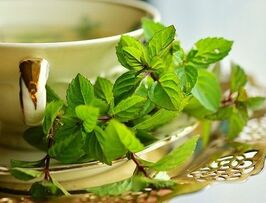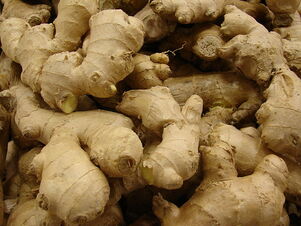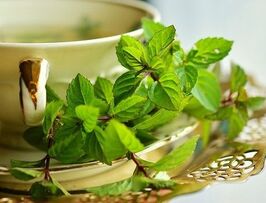 Digestive upset is a special kind of misery, and in cystic fibrosis and other digestive diseases it may be a common nuisance. Fortunately, herbal medicine is particularly effective in assisting people with these issues! All of our ancestors have been using medicinal herbs to address digestive distress for eons. Although conventional medicine has very few tools to assist us with gastrointestinal issues, especially with regards to chronic indigestion, there are many, many herbs which can help resolve GI symptoms including stomach aches, intestinal cramps, nausea, burping, constipation, loose stools and diarrhea, delayed gastric emptying, reflux, and more. In this article I will suggest a few herbs to use to address bloating and indigestion. There are so many medicinal herbs to choose from that I couldn't possibly discuss them all in one article, so I'll touch on a few that I use most frequently for myself and my clients. Indigestion is an umbrella term which includes gas, bloating, stomach aches, intestinal cramps, nausea, burping, constipation, delayed gastric emptying, and so on. If you experience indigestion frequently and the doctor doesn't know why or how to help you, they will likely give you a label of "IBS" (irritable bowel syndrome), then probably send you home with a generic solution like a proton-pump inhibitors and/or anti-depressants. Because herbalists think holistically, we understand that all body systems are interconnected. We also have many herbal and nutritional tools to address the pain and discomfort of indigestion, therefore we tend to choose more targeted therapies tailored to the individual need. Herbal medicine is very personal, some herbs work better for certain people than others, thus it requires a little experimentation. Luckily, the herbs I will mention below are safe and generally well-tolerated. Firstly, I want to remind my readers that in many traditional healing systems there is a strong connection between the lungs and digestion. This is especially relevant for those of us with cystic fibrosis. In the Five Phase Theory of Traditional Chinese Medicine, the lungs and large intestine are connected through the Metal element. Similarly, in Indian Ayurveda, eating certain foods that are hard to digest, like dairy, have an impact on our respiratory and intestinal mucus production (called ama). I see this connection frequently in my clients and in myself. Foods that we have particular sensitivities to (i.e. an over-reaction of the immune system) can cause excessive mucus production in our intestines, and by reflex via vagus nerve connection cause excessive mucus production in the lungs and sinuses. I experience this when I overeat or when I eat a meal with a difficult-to-digest combination of foods. The body produces mucus generally to flush away irritants more quickly, and so when foods irritate us, the guts produce mucus. Recognizing the connection between respiratory and digestive mucus production helps us make smarter dietary choices for our lung and sinus health. I've found that keeping a food journal can help keep track of these connections. I will also mention that the first step to having good digestion is eating foods suited to our personal needs and sensitivities. Every person digests differently and has different dietary requirements, so the foods we eat need to be tailored to our particular bodies. There is no "one size fits all" diet. I discuss this much more in depth in my eBook on digestion. Carminatives Carminatives are a class of medicinal herbs that assist with gas, bloating, nausea, delayed gastric emptying, and intestinal spasms. They contain volatile oils which are often spicy and aromatic. These essential oils have a counter-irritating effect which cause relaxation of the smooth muscles in our stomach, intestines, and the gallbladder or pancreatic ducts. When we have gas and bloating, what often causes pain is the spasming and griping of the muscles of our stomach and intestines as they try to move the gas down and out through the rectum (i.e. flatulence). Carminatives can help relax these spasms to let the gas pass more quickly and easily. Gas is created by the bacteria in our gut when they ferment upon certain types of carbohydrates. Different bacteria prefer different types of carbs for food - some prefer simple sugars like cane sugar, lactose, starches in white potatoes or refined flours, or dried fruit. Bacteria that consume simple sugars tend to be less beneficial to our health and gut microbiome, but not all of them are harmful. If we eat a lot of simple sugars frequently, these bacteria will overgrow and cause chronic digestive issues. Other bacteria, generally the ones that are good for our health, prefer to consume complex carbohydrates and fibers contained in fibrous plants and whole grains. These fibers are called "prebiotics". The more prebiotics we eat, the more we feed these beneficial bacteria, and the more they educate our immune systems to work properly. The harmful bacteria usually produce the most gas, so a first step can be to cut out simple sugars and replace them with fruits and vegetables. Sometimes eating fiber can cause bloating temporarily as the ecosystem of bacteria in our guts shift to favor the helpful species. Gas is not always a bad thing if it's mild and not too painful. However, certain individuals can develop such an imbalance in their gut microbiota that fiber can trigger severe gas, bloating, and/or pain. In these situations, a diet that is more selective with its fiber intake may be warranted for a time, such as a FODMAPS diet (which I discuss in my digestion eBook). Whether your gas is mild and transient, or severe and chronic, here are some herbs to help:  Ginger root Ginger root Ginger root is number one on this list because it can do so many things to heal the gut! It's anti-inflammatory, it speeds up gastric emptying, improves a weak appetite, and relaxes spasming intestinal muscles. It is amazing for nausea, motion sickness, stomach aches, and many other GI symptoms. It should be taken with caution in people with severe GERD, ulcers, or super sensitive stomachs, for its spiciness can be a little too irritating for some. A small dose goes a long way. I take capsules (1-3 capsules of 500mg each) as needed, especially after a big meal. Other forms are ginger tea, ginger candy, ginger tincture, powder, glycerite, and vinegar extract. Of course, you can always cook with it, which is the most traditional way! Remember to start with a low dose and work your way up - it's powerful! Ginger is considered warming or even "hot" in its energetic and physiological effects, so it's not as appropriate for use when it's very hot outside or if there's a fever.  Peppermint tea Peppermint tea Peppermint is a carminative herb almost everyone has used at some point in their lives. It is one of the most warming mints and yet is also anti-inflammatory in its after-effect, similar to ginger. Similar medicinal mints with slightly different flavors are spearmint, chocolate mint, apple mint, winter mint, and catnip. Catnip is considered gentler than peppermint, and is great for digestive upset in babies, toddlers, and kids. All mints are great for nausea, intestinal spasms, gas, and bloating. The best form to take is in a tea (infusion) of the dried leaves, but you can also take tincture or capsules. Capsules may be the least effective form because they have already lost a lot of their essential oils due to the powdering process. There have been many studies on the use of peppermint essential oil in very small doses (diluted in a carrier oil) taken orally to help with the symptoms of IBS. Culinary spices like fennel, cardamom, clove, turmeric, anise, black pepper, and others (including ginger, of course) contained in curry powders are all carminatives. Adding these spices to hard-to-digest foods can help prevent or relieve indigestion. Almost every culture has their preferred arsenal of carminatives, so use what is most common, comfortable, and tasty for you! Bitters I've talked about digestive bitters many times on this website, so I recommend reading about them more deeply here. But I will briefly say that digestive bitters (or "bitters") are alcohol or vinegar extracts of bitter herbs (usually roots) combined with carminative herbs to produce an all-around digestive remedy or "tonic". They can be taken 5-15 minutes before meals to stimulate digestive secretions to prepare for a meal: stomach acid from the stomach, bile from the liver, pancreatic enzymes and pancreatic bicarbonate from the pancreas, as well as saliva and salivary enzymes. Digestive secretions produced at the right time and in the right amounts help us digest our fats, proteins, and carbohydrates most effectively, reducing indigestion that can lead to gas, bloating, and mucus production. Some excellent bitter herbs are artichoke leaf, dandelion root and leaf, burdock root, angelica root (which is also carminative), chamomile flower (also carminative and nervine, making it excellent for colicky babies), horehound leaf (also carminative and expectorant for the lungs), elecampane root (carminative and expectorant), angelica root, and many more. In Europe, some cultures take "aperitifs" before or after meals, and now in the US, the hippest hipster bars are getting into bitters. Before the turn of the 20th century, doctors, pharmacists, and healers of all kinds would frequently suggest bitters for indigestion in Europe and the US. It's an old remedy that's making a comeback because it just works so well. There are no pharmaceuticals that can do what bitters do. Bitters also relieve gastric reflux or heart burn by encouraging the pyloric sphincter to close properly. It's very easy to make your own bitters with alcohol or vinegar, but you can also buy it from a few companies. I recommend Urban Moonshine.  Meadowsweet Meadowsweet Anti-inflammatory Herbs Sometimes the inflammation in our guts can cause diarrhea, pain, and even trigger inflammation in other parts of our bodies. There are some digestive herbs that I consider to be "topical" anti-inflammatories (that is, topical to our gut tissue when we ingest them). One of the best anti-inflammatory herbs for the guts is meadowsweet leaf and flower. It is somewhat astringent, so it's great for loose stools and diarrhea, and it is aromatic (a little carminative). It tastes great in tea. Meadowsweet also contains methyl-salicylates which are strongly anti-inflammatory (salicylic acid, which is aspirin, was originally derived from the methyl-salicylates in willow bark and meadowsweet leaf). Other great anti-inflammatory herbs for tea are marshmallow leaf, comfrey leaf, and plantain leaf. Each of these is demulcent (gooey) and soothing, helping to coat the gut tissue and protect it from irritants. These can help rebuild a deficient mucosal lining that has been degraded by chronic inflammation. A degraded mucosal lining can lead to "leaky gut" or increased intestinal permeability. For leaky gut in particular, comfrey root is the best. Comfrey root or leaf is good in tea (steep in warm but not hot water) or in tincture. The root is the slimiest, gooeyest herb I know of, and contains allantoin which helps speed up healing and tissue proliferation. It also contains prebiotic fiber to feed good bacteria. Comfrey needs to be used sparingly, however, because the root contains pyrrolizidine alkaloids, which are liver-toxic in large doses. Use comfrey root at moderate doses for only a few weeks at a time, or small doses for up to one or two months, then take a break. Comfrey leaf can be used a little more liberally. Do not use comfrey if you have liver disease. Marshmallow root has a similar slimyness to comfrey root, and is a safe alternative for those who are concerned about the pyrrolizidine alkaloids. It's best used as a powder of the root. Mix one half to one tablespoon of powder in a couple ounces of cold water, then let it sit for 5-15 min until the mixture gets thick and a little slimy. Drink this between meals or whenever esophageal or stomach irritation occurs. In the past, "slippery elm" (the powdered inner bark of the elm tree) was used the same way marshmallow root powder is used today. As a result of over harvesting and climate change, elm trees have become endangered, thus I discourage people from using slippery elm. In general it's best to take slimy herbs away from meals and supplements because the fiber can bind to supplements and make them less easy to absorb. I hope you will try these medicinal herbs next time you experience bloating and indigestion. To learn more about herbal medicine and diet to improve digestion, check out my eBook on digestion. If you try out the above herbs, please share your experiences in the comments section below!
2 Comments
I like to take care of my health, both physical and mental. To avoid deficiencies, I had to adopt a balanced diet and above all use a specific food supplement. It is on this article that I found the product that allowed me to relive and enjoy optimal well-being without health concerns.
Reply
Leave a Reply. |
Author
Mica (they/he) is a clinical herbalist, nutritionist, researcher, and writer living in Abenaki territory (Vermont). *************************** Disclaimer: The content of this website and blog is for educational purposes only and should not be considered medical advice. The information provided here is not intended to replace medical care. Archives
July 2024
Categories
All
|
Photo from BotanikGuide
 RSS Feed
RSS Feed
